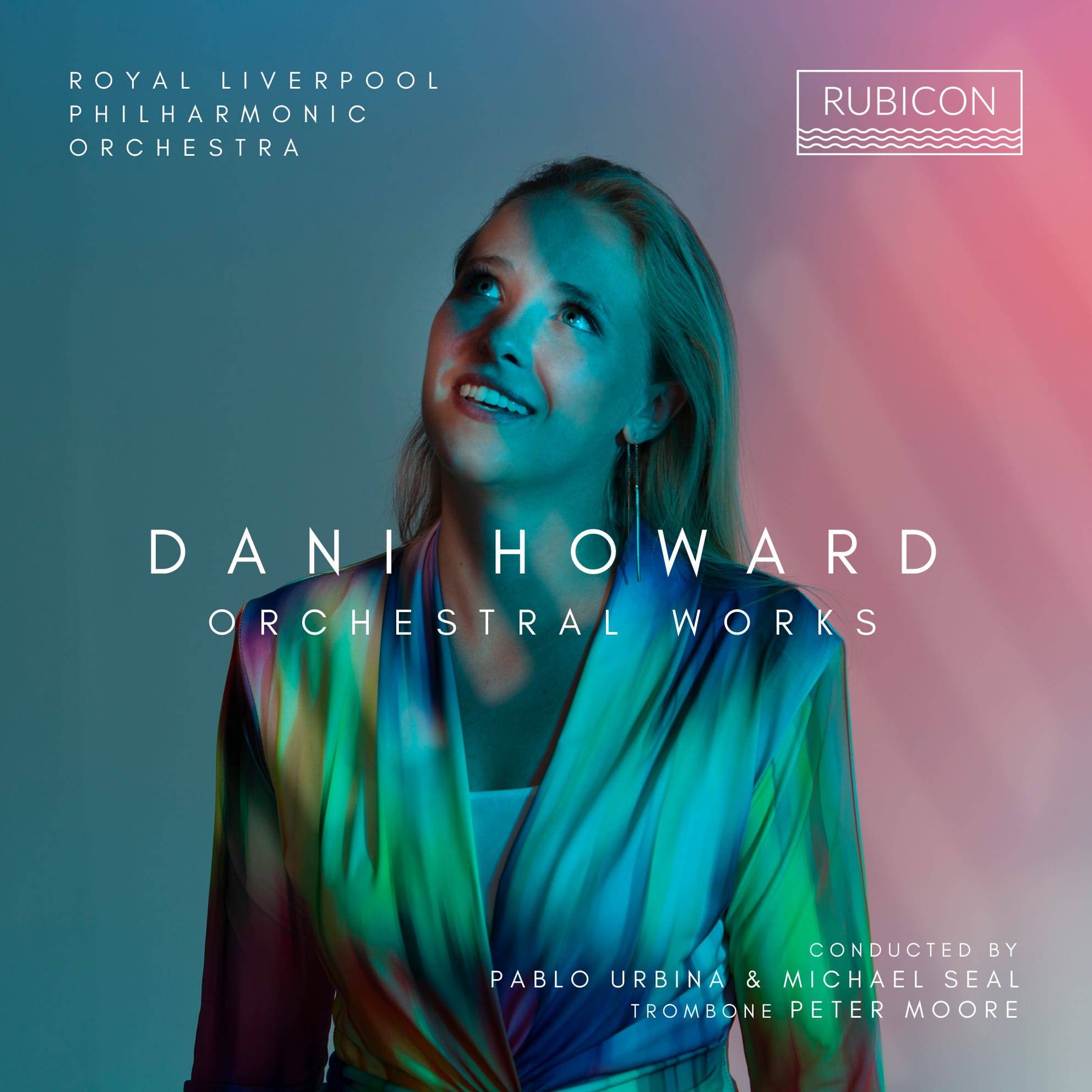Orchestral Works by Dani Howard
Dani Howard's kaleidoscopic music is showcased in superb performances and a phenomenal recording

Supported by the PRS Foundation's Composers' Fund and the Vaughan Williams Foundation, this Rubicon Classics disc showcases the orchestral music of talented composer, Dani Howard (born 1993), who also produced the recording (assisted by Dora Kmezic).

Dani Howard introduces this disc herself below:
It would normally be the case that music compiled for an album is written in close succession, its pieces conceived from the very beginning to be heard in sequence. This album, however, is a little different. It is more of a series of ‘moments in time’, moving through a range of my favourite orchestral pieces written between 2016 and 2021.
It has been a fascinating process to re-visit these earlier works,
to consider how they all fit together to create a coherent album, and to understand how each one played a unique role in my own personal and compositional journey through my twenties.
The first piece we hear was Howard's first piece for professional symphony orchestra, Argentum (2017), and the conductor here, Michael Seal, gave the very first performance. Here is the composer herself introducing the work:
... and here is a full (filmed) performance of the work given by the RLPO under Michael Seal:
Described as a “Short, fun, and reflective piece,” Argentum giltters, buoyant, irrepressible woodwind grounded by ultra-tight low brass interjections. The title is the Latin word for silver, and it is not difficult to hear how that maps onto the orchestration. Written for Classic FM's anniversary, the music seems tailor-made for the populist radio station's listenership in its easy accessibility. Hearing a performance of such accuracy and devotion from the Liverpudians without doubt shows the score in its best light - there is something almost American in the music's closing sense of extravagant jubilation.
Please click here for the sound-only performance on the disc.
My review of the World Premiere of Howard's Trombone Concerto, with Peter Moore as soloist and the Royal Liverpool Philharmonic Orchestra under Domingo Hindoyan (actually Hindoyan's first concert as then-Principal Conductor Designate) is here; the concerto was performed at the Barbican by Moore with the London Symphony Orchestra under Xian Zhang, and my review of that concert is here. Here, Moore is joined by the RLPO again, now under Michael Seal. The orchestra seems very comfortable with the piece: rhythms carry real energy, instrumental reactions to the soloist's lines are sure-footed and apt on the first movement, “Realisation”:
Moore's command of his instrument and of Howard's writing is never once in doubt (both Argentum and the Trombone Concerto were recorded in Philharmonic Hall in Liverpool on the same day, May 14, 2022). It is good to hear Moore's multiphonics close-up in the recording of the second movement, “Rumination”; haunting echo effects, too, work beautifully. Howard's writing for orchestra in this movement is masterful, and it is important to note this is not just texture for the sake of it; there is a sustained, coherent argument at work here:
The finale bursts with vibrancy:
Here is Dani Howard herself talking about the concerto and this debut album:
The final three works are all conducted by Pablo Urbina and recorded on October 11, 2022; the level of performance excellence never flags. Also dating from 2023, Ellipsis was “conceived as the musical equivalent of time-lapse photography”. It celebrates the Royal Philharmonic Orchestra's past 75 years within a constantly changing London musical environment. A passage of uneasy stasis presumably illustrates the Lockdown Years, out of which a solo oboe, soon joined by other woodwind colleagues, seem to strive for hope. This piece has a real cumulative feel about it, beautifully realised here. The recording allows, too, for every woodwind detail in the final bars to count:
... and here is a short introduction to Ellipsis by the composer:
Here is the composer on the penultimate piece, Coalescence:
Coalescence explores the concept of humans versus nature, and how,
over the centuries, our species has attempted to ‘outsmart’ nature in many ways. It was originally inspired after walking past an enormous tree in central London (with a trunk of at least a metre in width), which over the decades had grown in and around the solid metal railing built into the concrete pavement.
An image I couldn’t get out of my head for some time.
She continues:
“At the inception, the piece had a much more serious undertone than anything
I had written before, largely due to the subject matter. However, a slight shift
in gear occurred about midway through the writing process, when my dear friend and mentor and unbelievably talented jazz bass player, Flynn Adams, sadly passed away. This hit me quite hard and I couldn’t stop thinking about something he once said at a workshop we gave together: ‘This is not a maths test, this is music, and music is supposed to be fun!’. Something about that really made me think twice about what I was trying to achieve with my music, and I have since made sure that there is always an element of ‘fun’ in it.”
This piece does indeed traverse a number of moods, and Howard paints via orchestra beautifully. The more animated sections are performed with consummate expertise by the Liverpudlians: try from 7"40 - where the music's new momentum seems initiated by the tolling of a bell a few seconds previously.
The piece is indeed full of changes, of contrasts:
Finally, Arches, its title inspired by the actual construction of the venue which housed its premiere, St John's, Smith Square. The concert commemorated 400 years since the death of Shakespeare (it was shortly after this piece that Classic FM commissioned Argentum). The opening is mysterious, almost reverential, and the piece then overs a wide variety of textures and emotions (I wonder if I am alone in hearing an Americana reference round the six-seven minute mark?!). A lovely piece, and the perfect close to this interesting disc. I've included two performances below, one on the disc and a film of the St John's performance:
Dani Howard's kaleidoscopic music is showcased on this disc in superb performances and a fabulous recording of almost demonstration quality. Recommended.
The disc is available via Amazon, and Spotify is linked below:
